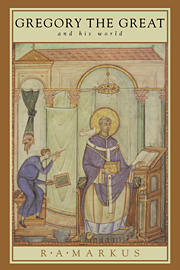Book contents
- Frontmatter
- Contents
- Preface
- List of abbreviations
- Maps
- 1 Introduction: a contemplative in a troubled world
- 2 Integritas animi: ministry in the Church
- 3 Sapienter indoctus: scriptural understanding
- 4 Appropinquante mundi termino: the world in its old age
- 5 The Christian community and its neighbours
- 6 Christiana respublica: within the confines of the Empire
- 7 Terra mea: Italy between two worlds
- 8 Argus luminosissimus: the pope as landlord
- 9 Scissum corpus: the schism of the Three Chapters
- 10 Ravenna and Rome: and beyond
- 11 In cunctis mundipartibus: the far West
- 12 Inconcussam servare provinciam: dissent in Africa
- Epilogue
- Appendix On the distribution of Gregory's correspondence
- Glossary of terms for offices
- Sources
- Secondary works referred to
- Index of Gregorian texts
- General index
6 - Christiana respublica: within the confines of the Empire
Published online by Cambridge University Press: 05 June 2012
- Frontmatter
- Contents
- Preface
- List of abbreviations
- Maps
- 1 Introduction: a contemplative in a troubled world
- 2 Integritas animi: ministry in the Church
- 3 Sapienter indoctus: scriptural understanding
- 4 Appropinquante mundi termino: the world in its old age
- 5 The Christian community and its neighbours
- 6 Christiana respublica: within the confines of the Empire
- 7 Terra mea: Italy between two worlds
- 8 Argus luminosissimus: the pope as landlord
- 9 Scissum corpus: the schism of the Three Chapters
- 10 Ravenna and Rome: and beyond
- 11 In cunctis mundipartibus: the far West
- 12 Inconcussam servare provinciam: dissent in Africa
- Epilogue
- Appendix On the distribution of Gregory's correspondence
- Glossary of terms for offices
- Sources
- Secondary works referred to
- Index of Gregorian texts
- General index
Summary
THE CHURCH IN THE EMPIRE AFTER JUSTINIAN
Before Gregory's time Christianity had spread beyond the confines of the Empire, both in East and West. From the river Indus to the Irish Sea and beyond, outposts of Christianity could be found in organised communities, often under bishops, though not always in full conformity with the standard pattern current within the Empire. Missionaries had penetrated to remoter areas of China and India. The core of the Christian Church, however, was and remained within the imperium Christianum. Ancient habits of thought encouraged the identification of the Empire as the natural setting of Christianity and its divinely sanctioned vehicle. Since Constantine the emperors – the short-lived Julian excepted – had identified themselves as Christian; increasingly, since the time of the Theodosian dynasty, the religion of the emperors had become the religion of the Empire. The Germanic kingdoms of Western Europe, established on what had been imperial territory, though they could still be seen in an imperial perspective (see below, pp. 95–6), in fact now curtailed the reach of imperial authority. We have become accustomed to see Gregory's pontificate in terms of two spheres of action which had thus taken distinctive shape in the course of the preceding century and a half: within the Empire, and beyond its boundaries. The diversity of the political conditions in which he had to act inevitably imposes such a distinction.
Within the Empire, Gregory's Church was the imperial Church shaped by Justinian's legislation, rounding off the work of his Christian predecessors.
- Type
- Chapter
- Information
- Gregory the Great and his World , pp. 83 - 96Publisher: Cambridge University PressPrint publication year: 1997



